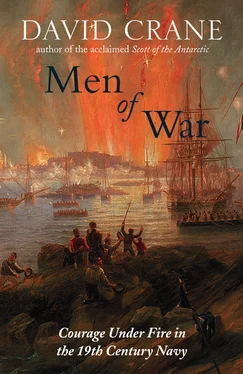An apprenticeship in Greece tolerably long has taught me the risks to which anybody newly arrived & possessed of some place & power is exposed. They know me, & they also know that I know them, yet they have not ceased & never will cease intriguing to get this vessel out of my hands, & into their own, which would be tantamount to ruining her. Knowing this, I take the liberty of leaving this letter to be delivered to the first officer in the command of a vessel; to caution him not to receive on board his vessel any Greek captain – they will endeavour under various pretences to introduce themselves on board & when once they have got a footing, they will gradually encroach until they feel themselves strong enough to turn out the original commander … If you want seamen – take none from Idra – Spetsia, Kranidid, Poros – the Ispariotes may be trusted in very small numbers – take a few men from one, a few from another island & thus you will be best enabled to establish some kind of discipline. Take a good number of marines – choose them from the Peasantry, & foreign Greeks, and you may make something of them … You must see Sir that in this my advice … I can have no interest any further than inasmuch as I wish well to the Greek cause & therefore do not wish to see a force that can render great service to the Greek cause rendered ineffective by falling into the hands of people totally incapable & unwilling to adopt a single right measure. In Greece there cannot be any artillery operations except such as are carried out by foreigners in their service.
It was not, perhaps, the triumphal return Hastings must have dreamed of, nor a document to inspire a sense of warm collaboration. But then charm or conciliation were never part of his prescription for success. Nor, in the fighting to come, would there be room for either if Greece was to be saved.
X
It would be impossible to exaggerate the dangers Greece faced over the winter of 1826–27. After a long and heroic resistance Missolonghi had at last fallen in April 1826, and with Athens under siege and Ibrahim Pasha’s Egyptians well on their way to making good his promise to carry off ‘the ashes of the Peloponnese’, the rapidly shrinking enclave that was ‘Greece’ seemed to be facing extinction. ‘The Morea has been devastated by the troops of Ibrahim in almost every direction,’ one impassioned American philhellene wrote of the country:
All Messenia, part of Arcadia, Ellis and Achaia, presented a scene of utter devastation; it would seem as if the siroc had blown over it for years, destroying every vestige of vegetable, and had been followed by pestilence in its train, which swept away every living thing that had once inhabited it. Those delightful plains, which poets in all ages have sung … were now barren wastes, where the roofless and blackened walls of the houses, the scathed and leafless trunks of the olive trees, and here and there the whitening bones of human beings, remained to tell that fire had passed over and blasted them.
This was the situation of at least one-half of the Peloponnesus; of its inhabitants many had been slaughtered, others carried off into slavery in Egypt, and the rest, where are they? Oh God! It is an awful question to answer, but it is a question which must one day be answered to Thee by this generation, who left thousands and tens of thousands of their fellow beings to be hunted like wild beasts; to dwell in the caverns of the rocks; to wander about, year after year, seeking for the roots of the earth, giving to their ragged and emaciated children sorrel and snails for food, unable to get enough of even this, and pining and dying – ay! Absolutely perishing from want, while the rest of the earth was full of fatness.
Here was a vision – with all its biblical and classical echoes – to stir the conscience even of governments, but whether it would do so in time was another question. From the very beginning of the war Greece’s only real hope had rested with the Great Powers, but it was not until the summer of 1825 that a first cautious approach to London from the Tsar led in the following spring to negotiations at St Petersburg and a jointly signed protocol calling for mediation and an autonomous Greece under Turkish suzerainty.
Even the prospect of the ‘barbarization’ of the Peloponnese – Egypt’s own Islamic take on seventeenth-century England’s Irish solution – was never going to win over absolutist Austria or Prussia, but by the end of the summer France had joined the negotiations. Over the next twelve months the three powers would edge their way towards the document that would finally become the Treaty of London, but until that was signed and the original protocol had grown some real ‘teeth’, the problem facing them was always going to be in enforcing an agreement that was inimical to the ambitions of both warring parties.
The Greeks were in no position to argue with a protocol that offered more than they could ever win for themselves, but as Roumeli, the Morea and finally the town of Athens fell into Ottoman hands there seemed less and less reason for the Porte to tolerate any interference in its own internal affairs. A revolt of the Janissaries had given them problems of their own, but with only the beleaguered Acropolis in Athens standing between them, the isthmus and the last pocket of Greek resistance in the western Peloponnese, it was a fair gamble that they could finish off the war before the three signatories could muster the resolve or the unity to intervene.
As the Greeks and the Turks both knew, though, intervention was only a matter of time, and so by the end of 1826 the key to the whole war and the geographical scope of any future Greece had become the fortress at Athens. From the late summer of 1826 the insurgents had poured all their resources into her relief, though two abortive attempts in August and October, and a third in December under the command of that heroic relict of Napoleonic glories, Colonel Fabvier, had only succeeded in burdening a starving garrison with Fabvier himself and another five hundred Greek and French volunteers.
The failure of one philhellene never seemed to discourage the next for very long, however, and in the following February one of the most distinguished of all British volunteers agreed against his better judgement to try where the French had failed. Thomas Gordon had been among the first foreigners to join the Greek cause in the early months of the war, but, sickened by the horrors of Tripolis, had almost immediately quitted the country, driven out by that familiar combination of plague and moral disgust that had seen off so many romantic philhellenes in the opening days of the conflict.
But at that point the generalisations fail, because with his Eton and Oxford background, his experience with the British and Russian armies, his intelligence, linguistic abilities, independence and – above all – immense wealth, Gordon was made of very different stuff. In the years since he left Greece he had continued to play an influential role in European philhellenism, and even in absentia he remained one of the very few disinterested foreigners with the skills and the knowledge of both sides to make a genuine contribution to the war.
A sense of duty? The lure of Athens? A touch of philhellene vanity? It is unlikely that even Gordon knew what finally brought him back to Greece, but it certainly was not experience or judgement. During the five years since the fall of Tripolis he had successfully resisted every Greek blandishment, but for once his resolve failed him, and pressed again to give his services, he allowed the pleas of a desperate government to overcome every military and political instinct he had.
Gordon knew a direct assault on the enemy position made no strategic sense – he favoured attacks on the Turks’ long and vulnerable supply lines – but he agreed all the same to a twin-pronged February landing at Piraeus and Eleusis, to the south and west of Athens. The experience of Fabvier in the open before Athens should have demonstrated once and for all the folly of any such strategy, but this was a war in which judgement was always at the mercy of fantasy, strategy in hock to politics, vanity, ambition, and the endless rivalries that set Greek against Greek, Greek against philhellene and philhellenes against each other.
Читать дальше











